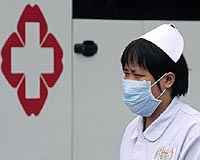| . |  |
. |
Tunis (AFP) Oct 6, 2009 Tunisia on Tuesday announced the suspension of the annual pilgrimage to Mecca because of the risk of the spread of swine flu and the impossibility of vaccinating candidates by mid-November. Minister of Religious Affairs Boubaker Akhzouri announced that the hajj had been postponed in order "to preserve human life." Vaccines ordered by Tunisia will not arrive until the end of October and Saudi Arabia has announced that it will only give hajj visas two weeks after the immunisation of the would-be pilgrim, Akhzouri said. This unprecedented decision affects about 10,000 Tunisians. The minister said that physical health was needed under Islam to undertake the hajj and he added that saving lives was "a founding precept" of the Muslim religion. Ahkouri's announcement came a day after a senior Saudi health official said his country is ready to welcome some three million pilgrims during the annual hajj to Mecca amid the heightened alert on the swine flu pandemic. Ziad Bin Ahmed Memish of the health ministry said despite the level six alert on the A(H1N1) virus, "Saudi Arabia has decided to hold the great gatherings in Mecca and Medina," Islam's holiest sites. He was speaking on the sidelines of a meeting of the east Mediterranean regional committee of the World Health Organisation, being held in the Moroccan city of Fez through Thursday. Memish pointed out that Saudi Arabia had been put to the swine flu test at the umrah or minor pilgrimage during the Muslim holy month of Ramadan in August-September. "We only had 26 cases of infections among two million pilgrims," he said.
earlier related report In response, the government had "urgently" sent 200,000 doses of influenza A(H1N1) vaccine to the region since Sunday's death in a bid to contain the virus, China's health ministry said in a statement on its website. "An influenza A(H1N1) sufferer in the region died after efforts to save the sufferer failed," it said. "This is our first domestic report of a swine flu death," said the statement, which gave no further details on the victim. However, state-run Xinhua news agency said in a report from the Tibetan regional capital Lhasa that the victim was an 18-year-old female who entered a hospital in the city on Saturday with severe flu symptoms. China -- hit hard in the past by bird flu and Severe Acute Respiratory Syndrome (SARS) -- took swift and tough measures against the virus when it first emerged in the Americas. This included strictly quarantining scores of foreign tourists and students merely for arriving on flights on which a virus sufferer was found. But China has warned of a spike in cases -- and deaths -- during the winter flu season. The health ministry said last month that "tens of millions" of people in the world's most populous country could get the virus in the coming months, adding that fatalities would be "unavoidable". The health ministry released a separate statement on its website after reporting the Tibet death, warning of a growing risk from the disease. "High-risk populations that already have underlying health conditions face especially great danger," it said. However, in an apparent attempt to head off any panic over the fatality, it also stressed that authorities had reacted proactively to the disease and put in place systems allowing them to move rapidly against any outbreak. The ministry statement also said China had now confirmed a total of 21,453 cases since swine flu first emerged, including 13 people who remained in serious condition. China began mass vaccinations against swine flu last month, making it one of the first nations to start inoculating its population against the virus. It has been at the forefront of efforts to develop vaccines, with several Chinese pharmaceutical companies already receiving government approval for versions they had developed. However, it has warned that demand would likely exceed supply. The health ministry has said it plans to vaccinate 65 million people, or five percent of the country's total population of 1.3 billion, before year's end. It said late last month that China would have a stockpile of 26 million swine flu vaccine shots by the end of October, with that number eventually surging to 100 million, but not before year's end. Share This Article With Planet Earth
Related Links Epidemics on Earth - Bird Flu, HIV/AIDS, Ebola
 China reports first swine flu death, warns of heightened risk
China reports first swine flu death, warns of heightened riskBeijing (AFP) Oct 6, 2009 China on Tuesday announced its first swine flu death, saying a patient in its southwestern Tibet region had died from the disease and warning the threat from the disease could soon worsen. In response, the government had "urgently" sent 200,000 doses of influenza A(H1N1) vaccine to the region since Sunday's death in a bid to contain the virus, China's health ministry said in a statement on ... read more |
|
| The content herein, unless otherwise known to be public domain, are Copyright 1995-2009 - SpaceDaily. AFP and UPI Wire Stories are copyright Agence France-Presse and United Press International. ESA Portal Reports are copyright European Space Agency. All NASA sourced material is public domain. Additional copyrights may apply in whole or part to other bona fide parties. Advertising does not imply endorsement,agreement or approval of any opinions, statements or information provided by SpaceDaily on any Web page published or hosted by SpaceDaily. Privacy Statement |